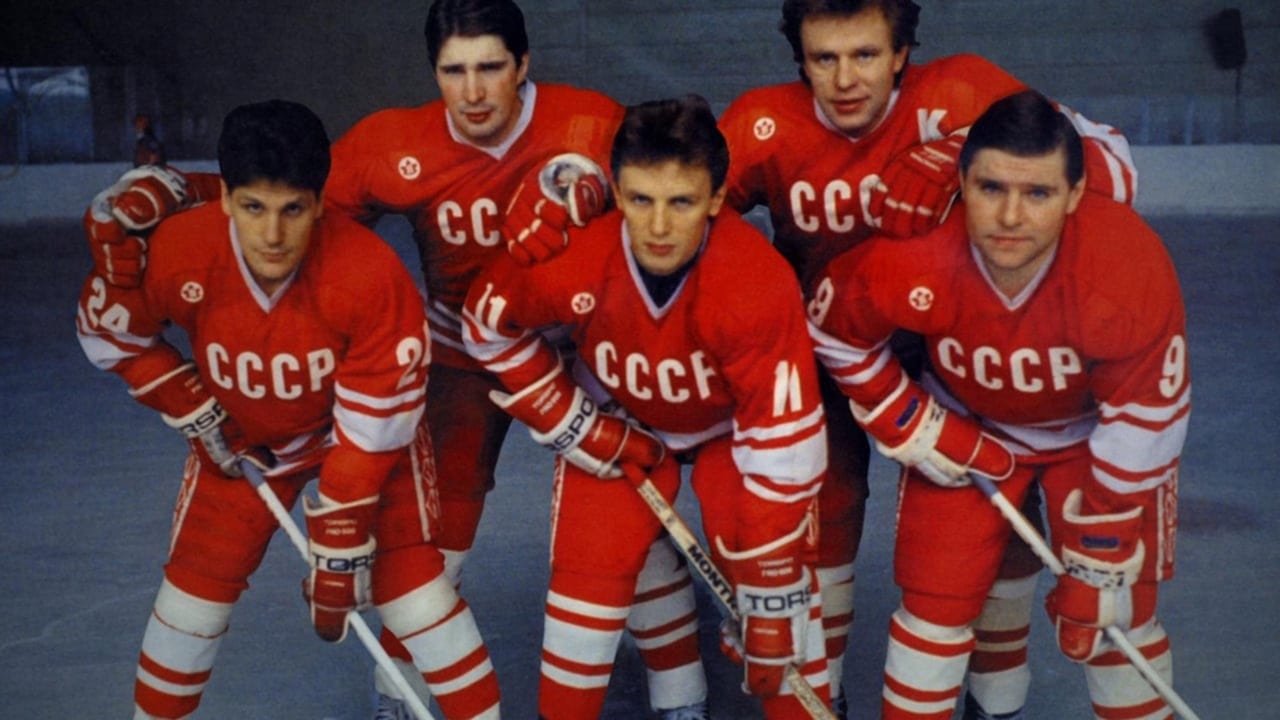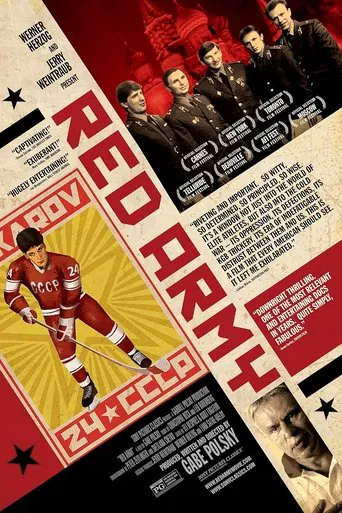

Good concept, poorly executed.
... View MoreFresh and Exciting
... View MoreThe movie is wonderful and true, an act of love in all its contradictions and complexity
... View MoreThere are moments that feel comical, some horrific, and some downright inspiring but the tonal shifts hardly matter as the end results come to a film that's perfect for this time.
... View MoreAfter the war, the Soviet Union struggled to rise from the ashes. Their hockey program became the best in the world. Coach Anatoly Tarasov created a game of crisp passing and strategy unlike anything in North America. They always won. Tarasov is fired after an incident that angered Khrushchev. The tyrannical Viktor Tikhonov became the new coach. He instituted an unrelenting regiment and is reviled by all the players. This movie follows them through the Miracle on Ice, the purge afterward, Perestroika, migration to the NHL, and finally rebuilding a new system from the latest chaos.This is another avenue to examine the USSR and the Cold War. It's best for hockey fans although there is very little new to real hockey fans. It's missing the shock value or truly new information. I think Fetisov has more to give. He's a main interview for this doc. He seems to be holding back since he's a big government Putin official now. This is a solid doc but a deeper dig could get something truly revealing.
... View MoreDuring the Cold War the Soviet Union took sport very seriously and ice hockey was a particular favourite. This film sets out to tell the story of the most successful five men produced by the Soviet system and they were all Red Army soldiers. It has interviews with the players as they are now including Fetisov who was one of the most driven of the men. It also uses archive footage from the era and uses the history of the time to contextualise what the men were going through. Some of the best bits were the Russians in action – they played with such grace and pose that it is a joy to watch – and I am not a sports fan in the least.The politics on and off the ice are covered too and there are more than a few tough memories brought to the surface. It is mainly in English but there is some Russian that is mostly translated. This is just a fascinating documentary about a little piece of history that I was totally unaware of – highly recommended indeed.
... View MoreSorry to say, I was very disappointed with this movie. Having managed to persuade a hockey legend and a politician of Russia to agree to partake on a "hockey documentary" is unfortunately the biggest achievement of Gabe Polsky on this title. I was really hoping to see and hear a lot more about the golden CSKA Moscow era and how it supplied the Soviet hockey team with the core of their succcess, but there is literally zero mentioning of this in the movie. The setting of the ambiance and the interviews are in my opinion quite overdramatized and it is obvious from the reactions of the interviewees they felt the same way. This could have been a far better film if more space was given to players from other countries who were confronted with the soviet team.
... View MoreI don't know if this documentary is the "Hockey Movie For People Who Don't Like Hockey". Actually, it isn't - rather, if you love hockey, especially the history and progression of it (and particularly if you remember these players from the likes of the Red Wings or the Devils), you'll have a fondness for it. But it's the core and characters in this story that makes Gabe Polsky's first documentary so successful, past the moments of gruffness from the interviewees - actually, it's mostly the main subject, the leader of the Red Army Hockey Team in the heyday of the early 1980s, Vyacheslav Fetisov. Inspirational sports movies can be enjoyed by most people, sports fan or not, but this also brings on the politics and world affairs into the mix. How could it not, considering it largely takes place before the Cold War ends? And leave it to the hockey masters here to wonder what a "Cold War" even really meant, if anything at all.Of course by the end of the film we see why Fetisov and a couple of the other interviewees would say that - they currently hold ranks in the Russian government under the sports division (yes, there is such a group, but then this IS a country that has a nationalized hockey team in its military). Nonetheless, this is a story that involves us with these players who know almost nothing of hockey - rather, that's what's drilled in to them by a couple of coaches, one a sort of wise, awesome sage, and then another who is a ruthless and cruel taskmaster - and the games that made them legends. The lack of hyperbole with these interviewees, especially Fetisov, makes things grounded in a reality that sports docs usually on TV lack. Lots of great clips from the games, many from the Olympics of the 80's (including those classics where the Russians made their names against the US and Canada), highlight the film and draw the audience in to the action.Again, you don't necessarily have to love hockey to get into the film. On the other hand, Red Army's ace up its sleeve is that it may actually get you interested once it's over. It feature such unusual, frenetic action on display - the Red Army front, those five players, each with their own nicknames and personalities and deep friendships formed as 'Comrades' with sticks - that you can't help but get into it. It's like watching a form of dance much as it's a sport or game. And, I must say once more, the political dimensions heighten the weight and consequences that the players took on in the history: keep in mind that just as early as 1989, it was unthinkable Russians could be in the NHL. Now, they're as common to see as Canadians or any of the other major countries that usually bring in players.So buckle in for 80 minutes of a riveting story, often with a lot of unexpected, wild humor. Example: an elder ex-KGB agent is interviewed and gives his take on having to cover the Red Army players when first playing in Canada, and other instances of the secret politicos in the hockey arena. Watch as suddenly his grand-child comes in to the interview and humanity is revealed past the gruff exterior. It's priceless.
... View More